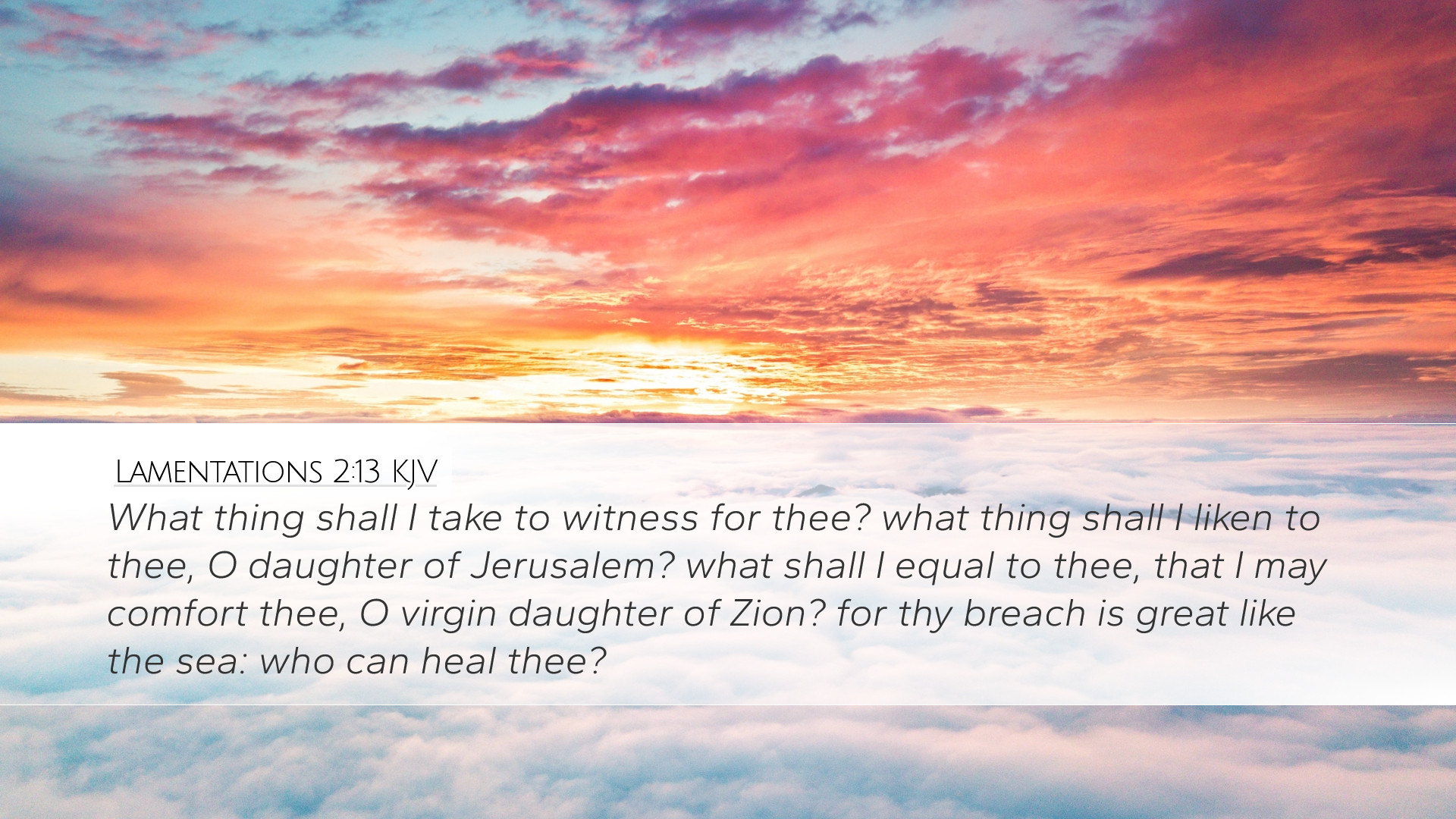Lamentations 2:13 Commentary
Verse Text: "What can I say for you? To what can I compare you, Daughter of Jerusalem? To what can I liken you, that I may console you, Virgin Daughter of Zion? Your wound is as deep as the sea. Who can heal you?" (Lamentations 2:13, NIV)
Introduction
The Book of Lamentations, attributed to the prophet Jeremiah, expresses profound sorrow over the fall of Jerusalem. In chapter 2, the poet reflects upon the devastation experienced by the city and its people. Verse 13 serves as a poignant articulation of the grief and despair pervading the community, urging readers to contemplate the depths of their sorrow.
Exegesis of Lamentations 2:13
This verse is structured as a series of rhetorical questions directed at the devastated Daughter of Jerusalem. It acknowledges the unparalleled nature of her suffering and seeks to provide a frame of reference for understanding her plight.
Comparison of Suffering
The opening question, "What can I say for you?" illustrates the speaker's helplessness in the face of overwhelming grief. Matthew Henry notes that the speaker feels an acute inadequacy in offering consolation given the magnitude of Jerusalem's misfortune. The city, depicted metaphorically as the "Daughter of Zion," represents not just a geographical location but the embodiment of the people’s collective suffering.
Imagery of Wounds
The comparison of the wound to the sea signifies its depth and vastness. Adam Clarke emphasizes that the metaphor of the sea conveys not only the depth but also the unmeasurable nature of the pain experienced. The sea, often tumultuous and unpredictable, serves as a fitting image for the chaos enveloping Jerusalem.
Nature of the Wound
The reference to the "wound" symbolizes both the physical devastation wrought upon the city and the emotional trauma of its inhabitants. Albert Barnes highlights that such a deep wound implies a need for profound healing, underlining the gravity of Jerusalem's circumstances.
Consolation and Healing
The rhetorical question, "Who can heal you?" reinforces the sense of despair. There is an acknowledgment of the futility in seeking relief as all human efforts seem inadequate. The absence of an answer points to the helplessness felt by the people of Jerusalem. Both Barnes and Henry reflect on the collective grief that permeates the community, suggesting that no human comfort can address the spiritual and physical calamity faced.
Theological Reflections
As this verse invites deep reflection, it also raises several theological issues regarding suffering and divine justice. The devastation of Jerusalem prompts one to ask about the nature of God’s judgment and mercy.
Understanding Suffering
Many scholars suggest this passage encourages an understanding of suffering as both a result of sin and as a means of drawing closer to God. Clarke notes that through this lament, the faithful are reminded that though immense suffering is present, God's presence and love are never fully extinguished.
The Role of the Community
Lamentations serves to unite the community in their grief. The acknowledgment of shared suffering allows the exiles to process their pain collectively. Henry articulates that this communal lamentation reinforces their identity as God's people, even in their darkest hour.
Practical Application
This verse and its commentary invite pastors, theologians, and students to reflect on the nature of grief, suffering, and healing within their own contexts. In pastoral care, acknowledging deep sorrow is crucial in providing support and comfort.
Encouraging Vulnerability
In sermons or counseling sessions, facilitating the expression of vulnerability may allow congregants to confront their wounds. It is essential to create spaces where the depth of suffering can be discussed openly, following the model of Lamentations.
Hope Amidst Despair
Ultimately, while Lamentations highlights profound sorrow, it is also a precursor to the restoration and hope found throughout Scripture. It reminds readers that healing—both corporate and individual—is possible through faith, prayer, and community support.
Conclusion
Lamentations 2:13 serves as a profound declaration of grief, embedding within it many layers of meaning regarding suffering and consolation. As we unpack this verse, we find insights that resonate deeply with the struggles faced by individuals and communities today. By recognizing and validating these emotions through reflection on scripture, the faithful can emerge with a deeper understanding of God’s presence, even amidst profound sorrow.


